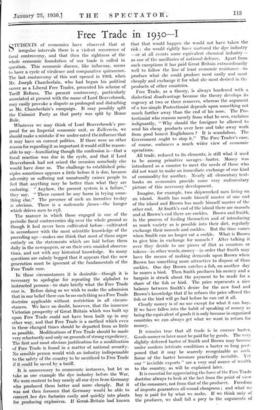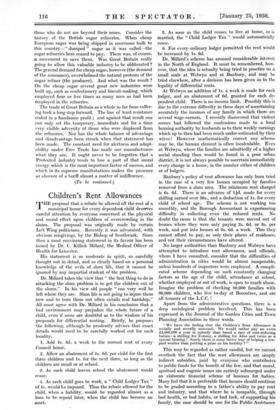Free Trade
in 1930—I
STUDENTS of economics have observed that at irregular intervals there is a violent recurrence of fiscal controversy, and that then the rightness of the whole economic foundation of our trade is called in question. This economic disease, like influenza, seems to have a cycle of virulence and comparative quiescence. The last controversy of this sort opened in 1903, when Mr. Joseph Chamberlain, who had begun his political career as a Liberal Free Trader, presented his scheme of Tariff Reform. The present controversy, particularly associated at present with the name of Lord Beaverbrook, may easily provoke a dispute as prolonged and disturbing as Mr. Chamberlain's campaign. It may possibly split the Unionist Party as that party was split by Home Rule.
Whatever we may think of Lord Beaverbrook's pro- posal for an Imperial economic unit, or Zoilverein, we should make a mistake if we under-rated the influence that it may have on current politics. If there were no other reason for regarding it as important it would still be reason- able to say—humiliating though the confession is—that a fiscal reaction was due in the cycle, and that if Lord Beaverbrook had not seized the occasion somebody else would have done so. The challenge to established prin- ciples sometimes appears a little before it is due, because adversity or suffering not unnaturally causes people to feel that • anything may be better than what they are enduring. " Anyhow, the present system is a failure," they say. " There cannot be any harm in trying some- thing else." The presence of such an incentive to-day is obvious. There is a malesuada fames—the hunger which drives men to evil.
The manner in which those engaged in one of the periodic fiscal controversies dig over the whole ground as though it had never been cultivated before—cultivated in accordance with the most scientific knowledge of the preceding age—makes one think that most of them argue entirely on the statements which are laid before them daily in the newspapers, or on their own unaided observa- tions, and not with any historical knowledge. So many questions are calmly begged that it appears that the new generation must be ignorant of the fundamentals of the Free Trade case.
In these circumstances it is desirable—though it is necessary to apologize for repeating the alphabet to instructed persons—to state briefly what the Free Trade case is. Before doing so we wish to make the admission that in our belief there can be no such thing as a Free Trade doctrine applicable without restriction in all circum- stances. We have no doubt, however, that the immense Victorian prosperity of Great Britain which was built up upon Free Trade could not haVe been built up in any other way, and that Free Trade is a method which even in these changed times should be departed from as little as possible. Modifications of Free Trade should be made very reluctantly and only on grounds of strong expediency. The first and most obvious justification for a modification of Free Trade is found in a matter of national security. No sensible person would wish an industry indispensable to the safety of the country to be sacrificed to Free Trade if it could be saved by a tariff.
It is unnecessary to enumerate instances, but let us take as one example the dye industry before the War. We were content to buy nearly all our dyes from Germany who produced them better and more cheaply. But it was not then foreseen that • Germany would be able to convert her dye factories easily and quickly into plants for producing explosives. If Great.-Britain had known that that would happen she would not have taken the risk : she would rightly have nurtured the dye industry —or at all events some equivalent chemical industry— as one of the ancillaries of national defence. Apart from such exceptions it has paid Great Britain extraordinarily well to follow the line of least economic resistance—to produce what she could produce most easily and most cheaply and exchange it for what she most desired in the products of other countries.
Free Trade, as a theory, is always burdened with a dialectical disadvantage because the theory develops its cogency at two or three removes, whereas the argument of a too simple Protectionist depends upon something not much further away than the end of his nose. The Pro- tectionist who reasons merely from what he sees, exclaims indignantly, " Why should the foreigner be allowed to send his cheap products over here and take away work from good honest Englishmen ? It is scandalous. The Government ought to stop it." The Free Trader's case, of course, embraces a much wider view of economic operations.
All trade, reduced to its elements, is still what it used to be among primitive savages—barter. Money was introduced as a counter to meet the needs of those who did not want to make an immediate exchange of one kind of commodity for another. Nearly all elementary text- books on economics provide some very rudimentary picture of this necessary development.
Imagine, for example, two shipwrecked men living on an island. Smith has made himself master of one end of the island and Brown has made himself master of the other end. At Smith's end of the island there are mussels and at Brown's end there are cockles. Brown and Smith, in the process of feeding themselves and of introducing as much variety as is possible into their diet, regularly exchange their mussels and cockles. But the time comes when Smith can no longer eat a cockle: What is Brown to give him in exchange for mussels ? After talking it over they decide to use pieces of flint as counters or tokens—in other words, money—in order that Smith may have the means of making demands upon Brown when Brown has something more attractive to dispose of than cockles. One day Brown catches a fish, on another day he snares a bird. Then Smith produces his money and a bargain is struck about the payment to be made for a share of the fish or bird. The price represents a nice balance between Smith's desire for the new food and Brown's knowledge that if he refuses the price offered the fish or the bird will go bad before he can eat it all.
Clearly money is of no use except for what it can buy. If we have fallen into the habit of speaking of money as being the equivalent of goods it is only because in organized countries we can always get what we want in return for money.
It remains true that all trade is in essence barter. Goods sooner or later must be paid for by goods. The very slightly deferred barter of Smith and Brown may become under modern intricate conditions a barter so long post- poned that it may be scarcely recognizable as such. Some of the barter becomes practically invisible. Yet our " invisible exports " are a very real source of wealth to the country, as will be explained later.
It is essential for appreciating the force of the Free Trade doctrine always to look at the fact from the point of view of the consumer, not from that of the producer. Freedom of imports guarantees all-round cheapness ; and what we buy is paid for by what we make. If we think only of the producer, we shall fall a prey to the arguments of those who do not see beyond their noses. Consider the history of the British sugar refineries. When cheap European sugar was being shipped in enormous bulk to this country—" dumped " sugar as it was called—the sugar refineries here ceased to pay. There was, of course, a movement to save them. Was Great Britain really going to allow this valuable industry to be obliterated The general demand for cheap sugar, however (the demand of the consumer), overwhelmed the natural protests of the sugar refiner (the producer). And what was the result ? On the cheap sugar several great new industries were built up, such as confectionery and biscuit-making, which employed four or five times as many men as had been employed in the refineries.
The trade of Great Britain as a whole so far from suffer- ing took a long step forward. The line of least resistance ended in a handsome profit ; and against that result one can only set the temporary, immediate and for a time very visible adversity of those who were displaced from the refineries. Nor has the whole balance of advantage and disadvantage been struck when that statement has been made. The constant need for alertness and adapt- ability under Free Trade has made our manufacturers what they are. It ought never to be forgotten that a Protected industry tends to lose a part Of that moral energy which is the most important factor of success, and which in its supreme manifestations makes the presence or absence of a tariff almost a matter of indifference.
(To be continued.)







































 Previous page
Previous page